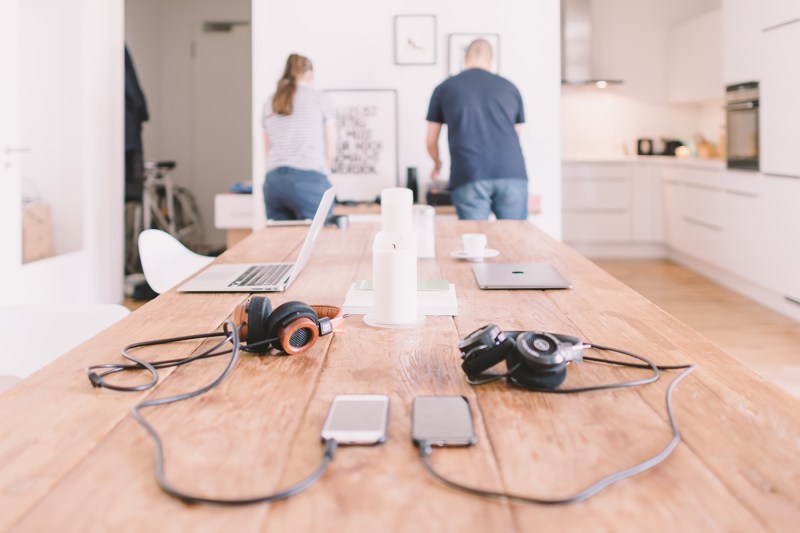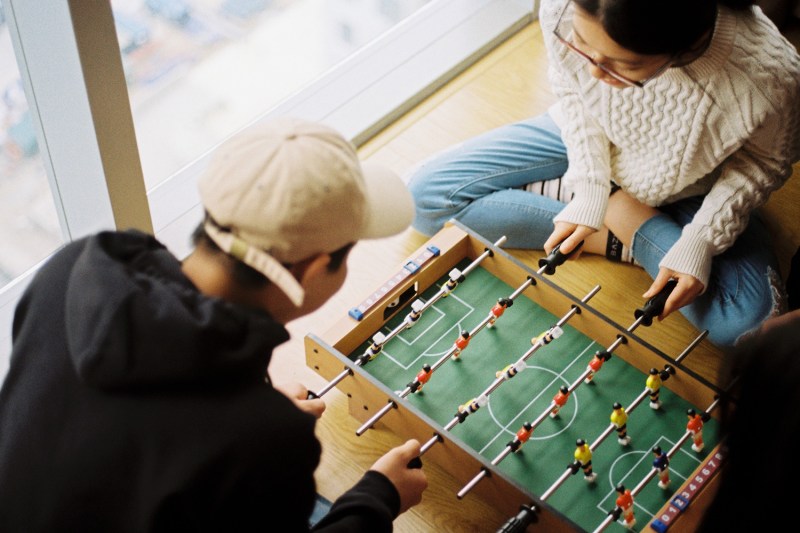With many cities, states, and even countries around the world asking people to stay home and shelter-in-place to slow the spread of COVID-19, friends, families, and couples are finding themselves stuck inside together for who knows how long. For couples, this can be uniquely challenging. For a few days, it can be fine. Fun, even. But as some areas start to hit the two-week mark for sheltering-in-place orders, even the most loving and understanding partnership (long-term or otherwise) can start to get strained from the lack of a varied routine, alone time, access to friends, family, and hobbies, and the stress of going through a global pandemic that has affected virtually every aspect of daily life. That’s a lot of pressure to put on any relationship. But there are steps you and your partner can take and practice to help navigate this situation together, and maybe even come out the other side better for it.
- Set Boundaries
- Keep a Schedule
- Give Yourselves Personal Time and Space
- Have a Special Date Night
- Communicate, Communicate, Communicate
- Fight Well
- Make Time For Friends and Family
- Pull Your Weight
- Be Kind and Forgiving with Each Other
- Get Some Fresh Air
- Try to Look on the Bright Side and Enjoy the Time Together
Set Boundaries
Going from having time away from each other for work, friends, and hobbies to spending all your time together 24/7 is jarring. In a short amount of time, you and your partner have had to adjust to new work (or even unemployment) and living schedules, as well as the stress, anxiety, frustration, anger, and sadness brought on by this whole situation. So it’s OK to set and reinforce boundaries for the things you need to continue operating. For example, say that your partner is having a hard time leaving you alone to do your work; they keep coming up to you to chat or show you things, but it’s distracting and you can’t focus. Or before confinement, having a beer or a drink with friends was your way to unwind at the end of the day, but now your partner is butting in on your Zoom sesh. To prevent tensions from rising, sit down with your partner and talk with them about setting necessary and doable boundaries that don’t intrude on work or downtime.

Keep a Schedule
Along the lines of setting boundaries, creating and keeping a “new normal” schedule will also help keep you off each other’s backs. Making a schedule that divides up the day into sections (like having breakfast together, then time apart for work, then lunch together, and so on and so forth) will help the day-to-day feel more normal and ordinary, which in turn will decrease depression or anxiety that can cause issues in your relationship. So give yourselves a new normal.
Give Yourselves Personal Time and Space
Taking time for yourself is a key part of a relationship regardless of pandemics. So keep it up during quarantine! Set aside some personal space once a day to do whatever you want: Take a bath or long shower, go for a walk or a run, go to a different room or part of the house to read or watch TV … the important thing is taking the time to recharge and reset, which will help ease tensions or frustrations.
Have a Special Date Night
Before shelter-in-place, what did you guys do for a date night or to spend time together just as a couple? Did you have a designated date night with dinner and a movie? Did you go for a hike together? Did you visit new places throughout your city to explore together? Did you make a special meal together? Keep that practice up as best you can while still staying home and practicing social distancing. It’s the “prioritizing time for your relationship” part that’s important, so keep that date night and get creative. Since we’re all now spending too much time in front of our screens, maybe have a no-screen night, making a meal together and then playing a board game or just talking. Or, if you usually went out to the movies for date night, hang some sheets, make a fort, and have a movie night that way. Love music? Watch a virtual concert or performance. There are all kinds of ways to keep the magic alive, even in close quarters.

Communicate, Communicate, Communicate
Want to know the secret to a happy, healthy relationship? Communicate. Want to know the secret to a happy, healthy relationship when you are legally obligated to be all up in each other’s faces for weeks on end? Communicate. Now is when it’s especially important to take the time to talk AND listen to your partner. Set aside time throughout the week to check in with each other and get things off your chest. And that doesn’t just mean sharing how you’re feeling; also discuss real-world concerns like financial matters (especially if you or your partner have been laid off, furloughed, or had their hours reduced) to make sure you’re on the same page.
Fight Well
Even without being stuck indoors together, fighting (when done right) is a normal and healthy part of a relationship. But the added pressures of recent events can make a fight about whose turn it was to do the dishes or take out the trash escalate into name-calling screaming matches where no one wins and everyone feels miserable (and then you can’t even get away to decompress). So if you’re going to fight, fight well by not engaging in unhelpful practices like shaming or degrading. You two are on the same side; empathize with your partner’s position and talk it out. There’s a saying about fighting in relationships: it’s not you versus them, it’s you two versus the problem. Remember that it’s you two against the world right now. COVID-19 is the problem. You two can tackle it together.
Make Time For Friends and Family
Right now, we’re all feeling a bit cut-off and disconnected from our friends and family. Going out and spending time with our loved ones is part of what helps us have full, well-rounded lives and now that’s been taken away from us (and even those cool Zoom backgrounds can’t fully help). But maintaining a social circle and life outside your relationship is key, so hold onto that time by arranging one-on-one video or phone calls with friends and family to play games, have a drink, watch movies, or just talk without your partner around. It’s still great to keep your partner connected to your loved ones as well, but make some personal “guy” time to hang out on Zoom with your buddies or chat with your parents.

Pull Your Weight
It can be tempting to let things slide when you’ve worn sweatpants for a week and have barely left the house, but you’re still an adult in a cohabiting relationship. Don’t slack off in your relationship or your duties in the home. Yes, we’re all facing unprecedented challenges right now so it’s OK to cut yourself and your partner a break now and again, but right now you two need to support each other and hold the other up. That means continuing to pull your weight around the house with chores, or even helping out even more if your partner is struggling. What’s a couple of extra rounds of doing the dishes in the long run if your partner had a hard day and doesn’t want to do them? Swallow your pride and just do it.
Be Kind and Forgiving with Each Other
Right now, none of us are in the best headspace. We may forget small things we normally wouldn’t. We may snap at each other over tiny things. We may not fully be feeling or acting like our normal selves. When you walk in and see that sink full of dishes or are given a curt answer when you ask a question, take a deep breath and try to let it go. We all need some compassion and understanding right now, so try to cut your partner some slack. And if there are things they’re doing that are truly driving you batty, cool off and then talk about it with them in a productive way (re: communicating and setting boundaries).

Get Some Fresh Air
Most places with shelter-in-place or stay home orders are still permitting people to leave their home for essential tasks like getting groceries and exercising (provided they practice social distancing while doing so). So take advantage of it! Make time for a daily walk together to get some fresh air, exercise, and a change of scenery. Going for a walk on your own also works, as it gives you some alone time with all the above benefits, helping you clear your head and come back ready to see and interact with your partner again.
Try to Look on the Bright Side and Enjoy the Time Together
There is a lot to be concerned about right now. But try to put a positive spin on things: This is a universe-mandated time-out to connect and spend time with your partner, especially if you’re both usually very busy. So soak it up! Talk with them, watch movies, listen to music, have sex, try a new hobby together. View this as valuable together time and make the most of it. Remember your blessings and who you’re being quarantined with: There’s a reason they’re your partner. Be thankful for their health and safety, and consider your luck to have someone you love by your side to get through this.
Editors' Recommendations
- 10 Small DIY Projects You Can Tackle While Stuck at Home
- 6 Ideas for an Epic Date Night At Home
- 5 Best Online Learning Platforms to Enhance Your Job Skills
- 8 Educational YouTube Channels for Learning Something New
- The Best Non-Fiction Books About Pandemics, Diseases, and Outbreaks of the Past



